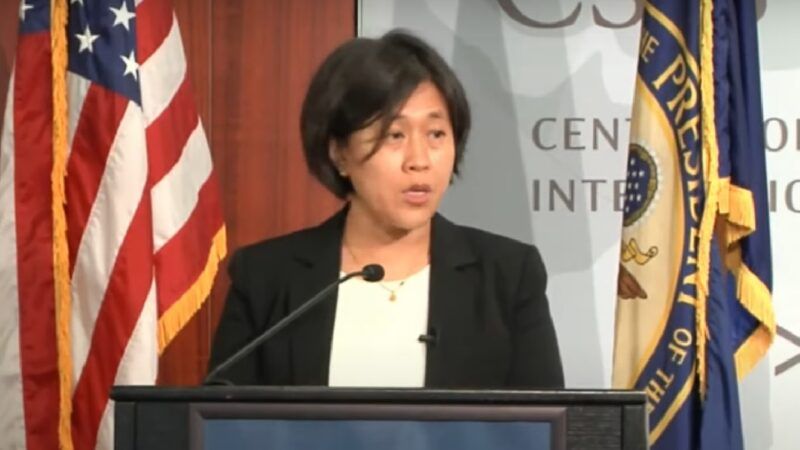Biden's China Trade Policy Is Littered With Contradictions
U.S. Trade Representative Katherine Tai stresses the need for American competitiveness at the same time that the White House is pushing huge tax increases on U.S. businesses. And that's just the start.

More bureaucracy. More industrial policy. Maybe even more tariffs.
President Joe Biden's trade policy is sounding more and more like an extension of the mess that former President Donald Trump made—and even the White House top trade officials are now admitting as much.
U.S. Trade Representative Katherine Tai delivered a speech Monday morning that White House officials had been touting as a major signal of the Biden administration's shifting strategy in the trade war with China. In fact, the speech mostly doubled down on what Trump spent four years promising: that a mixture of big government at home and barriers to trade from abroad will strengthen the U.S. economy and benefit American workers.
There's plenty of evidence to show that Trump's approach failed, but what Tai outlined was more of a shift in style than in substance. Rather than all-caps tweets about China stealing jobs, the Biden administration is pushing what Tai described as "a worker-centric trade policy" that will include "smart domestic investments"—Washington-speak for giving unions more influence over policy and for lots of new industrial subsidies.
The few concrete steps included in Tai's remarks are tightly linked to the previous president's agenda. They include a promise to "discuss with China" its failure to deliver on promises made in the so-called "Phase One" trade deal inked in 2020, and a rejiggering of the flawed tariff exclusion process—one that allows federal bureaucrats to decide which American businesses have to pay tariffs and which do not—set up by the Trump administration. Rather than charting a new course, those agenda items merely refine and entrench the protectionist impulses of Biden's predecessor.
The tariffs are the most obvious part of that. More than half of the goods traded between the world's two largest economies are now subject to tariffs, according to data from the Peterson Institute of International Economics—up from less than 1 percent before the trade war began. And there should no longer be any doubt that American businesses and consumers are paying the vast majority of those added costs. Less than 8 percent of the tariff costs are falling on China, according to one recent study by Moody's Investment Service. The tariffs have also failed to drive international investment away from China, as Trump often claimed they would.
Reforming the tariff exclusion process won't fix any of that. But Tai said Monday that the Biden administration continues to view tariffs as "a very important tool" in enforcing trade agreements. In an interview with Politico last week, Tai was even more direct, saying she views Trump's China tariffs as "something for us to build on and to use in terms of defending to the hilt the interests of the American economy, the American worker and American businesses and our farmers, too."
That's a long way from Biden's pointed criticisms during last year's campaign of how Trump's tariffs had failed to achieve their goals.
What Tai outlined on Monday is riddled with similar contradictions.
She declared that "boosting American competitiveness becomes all the more important" in light of competition with China, but there's an obvious tension between that and the Biden administration's efforts to pass a tax increase on American businesses. Expecting American companies to become more competitive when you're taxing their imported inputs and then raising taxes on whatever profits they can still eke out is simply denying economic reality.
Similarly, Tai said it was "critically" important for the U.S. to work with its allies to shape trading policy with China. But that will be more difficult if the Biden administration keeps making a big deal out of the unilateral "Phase One" deal. Why? Because last year China canceled purchase contracts with some U.S. allies, such as Australia, in an attempt to meet the obligations included in the deal. Global trade is a network, not a zero-sum game, and what happens between two nations can have unintended consequences elsewhere.
Perhaps nothing Tai said made that point more explicitly than when she sought to correct William Allen Reinsch, a senior advisor at the Center for Strategic and International Studies, the D.C. think tank that hosted Tai's speech, for framing a post-speech question to Tai around the idea that Trump's trade policies had "failed, which I think most people would agree to."
"I don't think it's fair to say that I've characterized the previous administration's efforts as 'failed,'" Tai said. "What I would say is that it hasn't gotten us to where we want to go."
Most people would call that failure.
Regardless of what Washington word salads might be used to justify it all, the Biden administration is trying to repackage Trumponomics into a kinder, gentler protectionism—one that gives bureaucrats even greater control over who pays and who benefits.
